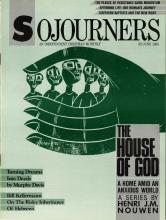The Mennonite farmer was wearing suspenders, a waistcoat, and work trousers. His wife wore the traditional long dress and head covering. They came forward to sign the Pledge of Resistance. A Catholic sister said her whole community had signed the pledge.
A former missionary, a Presbyterian lawyer, a Baptist minister, an evangelical seminary professor, a Jewish nurse, a Vietnam veteran, a Catholic bishop, and a member of Congress are only a few of the 62,000 U.S. citizens who have now pledged to resist a U.S. invasion or major military escalation in Central America as part of a "contingency plan"; more than half of the signers have promised to go to jail if necessary. In April the Pledge of Resistance was invited to present the plan to the National Network of Grandmothers.
That same month the Reagan administration made the congressional vote on funding for the contras into a virtual declaration of war against Nicaragua. The vote's political significance became more important than the actual money. Though stopping direct U.S. military aid to the contras won't end the war—the contras will continue to find other sources—the administration's success in getting Congress to agree, in principle, to the military overthrow of the Nicaraguan government would have been a disaster, both for the people of the Central America and, in time, for the people of the United States.
Therefore, the Pledge of Resistance mobilized the contingency plan by calling for nationally coordinated legal vigils at congressional field offices throughout the country on April 16, the day following the president's major speech for contra aid in Washington, D.C. The call was a good test of our network. Within 48 hours the signal had gone first to regional coordinators, then to state and local coordinators, and finally, through the phone trees to signers of the pledge.
Read the Full Article

